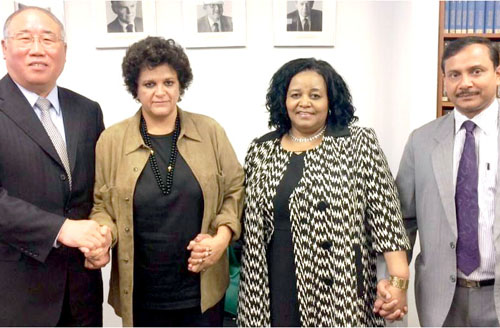Climate: emerging narrow proposals
At a meeting at the United Nations, Brazil, South Africa, India and China advocate justice and ambition in the future protocol that will regulate carbon emissions in the world
Divulgação
|
 |
Izabella (E) and the ministers of Basic: joint action
|
By: Lucas Tolentino - Editor: Marco Moreira
The Brazil declared joint intent with South Africa, India and China in the new cutting as emissions of greenhouse gases, which is expected to close by the global community in December. Gathered in official mission to the United Nations in New York, the environment ministers of these nations have agreed the need for differentiated reduction targets as the reality of each nation
Together, the four countries form the so-called Basic group. Although not negotiate collectively, conduct periodic meetings to tack common issues that are defended annually in Conferences of the Parties (COP) to the United Nations Framework Convention on Climate Change (UNFCCC. The acronym in English). The 21th COP will take place in December in Paris, and is expected to generate an international agreement able to curb global warming.
COMMITMENT
The environment minister of Brazil, Izabella Teixeira, and the other representatives of Basic defend, at COP 21, a commitment to different obligations for developed nations and the developing countries. "We want a fair and robust agreement," said Izabella. The intention is that developed countries take on more ambitious targets while developing ones are strengthened to take on greater commitments to cut emissions.
To limit the increase in global average temperature to 2 degrees Celsius, the Basic defend maintaining the principle of common but differentiated responsibilities, in cutting greenhouse gas emissions. With this, and the expectation is to achieve the greatest possible effort of the 193 signatories of the UNFCCC, as the possibilities, peculiarities and economic and social realities of each.
In addition, the ministers agreed that the new climate agreement must ensure transparency and be deployed review mechanisms capable of filling possible future gaps. The group also highlighted the importance of the contributions Intentional Nationally Determined (INDCs, its acronym in English), which include specific measures to be met by countries when the agreement start to count.
LEARN MORE
While it is considered natural, the greenhouse effect has increased in recent decades and generated climate change. These changes result from the uncontrolled increase in emissions of substances such as carbon dioxide and methane. The release of these gases in the atmosphere occurs for a number of human activities, including transportation, deforestation, agriculture, cattle raising and the generation and power consumption.
Therefore, the Conference of United Nations on Environment and Development, Rio 92, resulted in the establishment of the UNFCCC, which has 193 signatories. Every year, representatives of all these nations gather at the Conference of the Parties (COP) to develop goals and proposals for mitigation and adaptation, and to monitor the actions and agreements reached earlier.
Under the UNFCCC, the Kyoto Protocol obliges developed countries to reduce emissions by 5% based on 1990 data Signed in 1997 in the Japanese city, the pact was initially the accession of 37 rich nations, which have taken different commitments within the global goal decrease. Despite being outside the group, Brazil voluntarily signed the protocol and defined reduction of own goals in the country. The Protocol runs until 2020, when it will be replaced by the agreement that the parties intend to negotiate and sign later this year, at COP 21 in Paris.
Social Communication Office (Ascom / MMA) - 2028.1165
